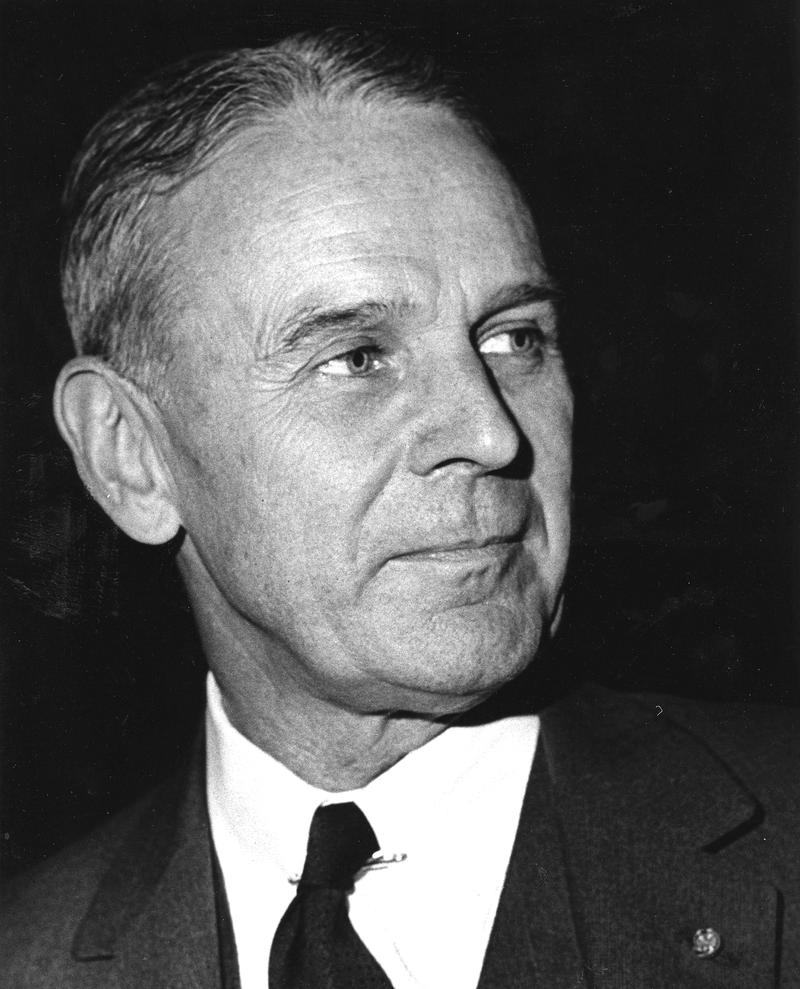Maxwell Taylor and The Uncertain Trumpet

Although he jokes about his editor suggesting that, as a publicity stunt, he "get himself court-martialed," General Maxwell Taylor has pretty much done the next best thing, ostentatiously retiring as Army Chief of Staff at fifty-eight so as to have the freedom to write his highly critical book, The Uncertain Trumpet, which he is here at this 1960 Book and Author Luncheon to promote. Quoting Clemenceau, "War is too important a matter to be left to the soldiers," he is in effect going over the head of his superiors and taking his case directly to the American people. His thesis is America's post-war policy of relying heavily on nuclear missiles has lost its justification. We have no longer have a monopoly on nuclear weapons, indeed there is now a "missile gap" in relation to the Soviet Union, and we have failed develop any anti-missile defenses. Meanwhile "we continue to accept inferiority in the case of ground forces." Taylor calls for a complete "reappraisal of military policy." This can only be done by reestablishing civilian control of the military. He speaks of his time as a member of the Joint Chiefs of Staff as one of "endless wrangling" during which nothing was accomplished. He then begins to offer a number of "quick fixes," including organizational changes and modernization of equipment, before, unfortunately, the recording abruptly ends, completed on a missing transcription disc.
Maxwell Taylor (1901-1987) was as qualified and attractive an example of the American military establishment as one could ever hope to find. As the New York Times described in his obituary:
The tall, ramrod-straight general was a hero in the invasion of Sicily and Italy and, when he parachuted with the 101st Airborne Division into Normandy on D-Day in June 1944, he became the first American general to go into battle on French soil. He was a major figure in the winning of the Battle of the Bulge. General Taylor might as easily have pursued an academic career. He had been a top honors graduate of West Point and later taught languages there. Fluent in several languages, he was as familiar with Virgil and Polybius as he was with Caesar and Clausewitz.
Yet to many historians, as well as participants in the Vietnam conflict, Taylor bears the brunt of responsibility for involving America in a hopeless and unnecessary war. The impetus for recommending the country escalate its mission in a small, strategically insignificant country, can be traced to the very program Taylor is pushing in this talk. With the advent of nuclear weapons, power within the armed forces had shifted to the Air Force, which could deliver bombs. This was a far more cost effective means of defense than maintaining large ground troops which, because of those bombs, might never be necessary in the event of full-fledged global conflict. Taylor, foreseeing the level of Mutual Assured Destruction that would eventually be reached, correctly argued that in the future there would be numerous smaller "brushfire wars," for which the Army must be prepared. Shortly after this speech, with the election of Kennedy, Taylor was back in the Army, eventually being appointed Head of the Joint Chiefs of Staff. Critics accuse him of ignoring the other Joint Chiefs' misgivings about engaging in the sort of small scale war he envisioned and actively sought in Southeast Asia. Kennedy himself was leery of the project. It is unclear how committed he was to sending troops, whereas Johnson felt he had "inherited" the war from his predecessor. As the website for Arlington National Cemetery summarizes:
…General Taylor was accused of intentionally misrepresenting the views of the Joint Chiefs to Secretary of Defense McNamara, and cutting the Joint Chiefs out of the decision making process. Whereas the Chiefs felt that it was their duty to offer unqualified assessments and recommendations on military matters, Gen. Taylor was of the firm belief that the Chairman should not only support the President's decisions, but also be a true believer in them. This discrepancy manifested itself during the early planning phases of the war, while it was still being decided what the nature of American involvement should be. McNamara and the civilians of the Office of the Secretary of Defense were firmly behind the idea of graduated pressure, that is, to escalate pressure slowly against the N. Vietnam, in order to demonstrate US resolve. The Joint Chiefs, however, strenuously disagreed with this, and believed that if the US got involved further in Vietnam, it should be with the clear intention of winning, and through the use of overwhelming force.
It is difficult to judge, even now that the passions of the Vietnam War have cooled, if Taylor was simply a zealous, well-intentioned patriot or if he let the bruising turf wars among the various branches of the armed forces cloud his judgment. In either event, he had to live with the catastrophic results of his policies. The website Why Vietnam Matters reports that:
…in an interview before his death, Gen. Maxwell Taylor concluded we had failed in Vietnam because “we didn’t know ourselves. We thought we were going into another Korean war, but this was a different country. Secondly, we didn’t know our South Vietnamese allies. We never understood them, and that was another surprise. And we knew even less about North Vietnam.”
Audio courtesy of the NYC Municipal Archives WNYC Collection.
WNYC archives id: 150253
Municipal archives id: LT9000
